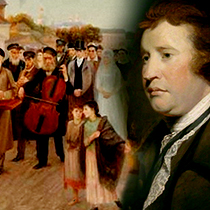New York City
Tradition and Freedom:
Philosophy, Theology, Literatureעברית
Applications are now closed
Instructors: Yuval Levin, Jacob J. Schacter, and Ruth Wisse
Stipend: $2,000 (NYC area residents); $3,500 (Domestic US); $5,000 (International)
 At the sublime moment when God reveals His presence at the burning bush, God describes Himself as “the God of thy father, the God of Abraham, the God of Isaac, and the God of Jacob.” Moses had not known those men who lived in another land centuries before his birth. But tradition, the inheritance of the wisdom of the past, preserved by the old and passed on to the young, has been a basic Jewish orientation from the very beginning. Telling and retelling the Jewish story from generation to generation is the classic Jewish mode of education.
At the sublime moment when God reveals His presence at the burning bush, God describes Himself as “the God of thy father, the God of Abraham, the God of Isaac, and the God of Jacob.” Moses had not known those men who lived in another land centuries before his birth. But tradition, the inheritance of the wisdom of the past, preserved by the old and passed on to the young, has been a basic Jewish orientation from the very beginning. Telling and retelling the Jewish story from generation to generation is the classic Jewish mode of education.
So how does a people, sustained and inspired by its tradition, develop strategies to live well in our democratic age, where the equality of conditions and the destruction of old social and political hierarchies have had a profound effect on the human mind? How does tradition relate to democratic freedom, including reigning ideals of human autonomy—in politics, in religion, and in philosophy—that hold the source of truth to be personal experience and individual reason? In such a culture and in such a world, the idea of inheriting a body of wisdom on the authority of the past is anathema. Yet in our practice if not our enlightened doctrine, we in the West continue to bow to precedent, we follow laws we did not choose and which we strain to rationalize, and we adopt manners unscrutinized, manners whose origins remain veiled in the recesses of our collective memory. More than most, Jews acutely feel the presence of a past that we cannot explain but which continues to hold us. We are caught between the yearning to be unshackled and self-ruling and the yearning for the guidance of wisdom past.
What is tradition? What is it good for? Does tradition constrain freedom, or is it the necessary condition to sustain freedom? What types of regimes are conducive to inherited ways of life, and what types of regimes denigrate the past in the name of progress and innovation? What are the intellectual rivals of tradition? What spiritual and intellectual resources should guide us when an inherited tradition no longer seems good? What role has tradition played in the flourishing of the Jews and of the West?
This institute will examine these questions in three distinct bodies of work relevant to contemporary Jews. Political theorist and policy intellectual Yuval Levin will lead us in an effort to explore some of the tensions between philosophy and tradition in Western thought and between freedom and tradition in modern politics. Rabbi Jacob J. Schacter will show how similar themes—including the role of “collective memory” for Jewish culture, the place of tradition in a world that venerates individual choice, and the countercultural ethic of submission to a set of “revealed truths”—are reflected in rabbinic thought. And Professor Ruth Wisse will help us to see, through the eyes of Jewish literature, how the original clashes between tradition and modernity continue to inform our contemporary choices.
Who Should Apply?
The Tikvah Advanced Institutes are aimed at men and women who wish to influence the intellectual, religious, and political life of the Jewish people and the Jewish state. Applicants may include those pursuing study or careers in US or Israeli public policy, the rabbinate, academia, journalism, Jewish education, Jewish communal leadership, law, and business. Lay leaders are also encouraged to apply.
Time and Location
This institute will take place at the Tikvah Center in the heart of New York City (165 E. 56th Street). This is a full time commitment for Monday-Friday, with required sessions in the morning, afternoon, and some evenings.
Additional Details
Applications are now closed
Stipends are valued in U.S. dollars, but are dispersed to Israeli participants in shekels. We will convert from dollar to shekel based on the exchange rate on the date of payment.
